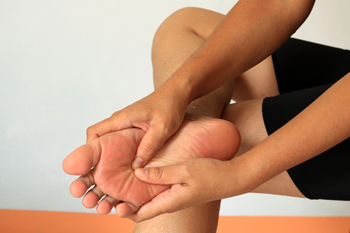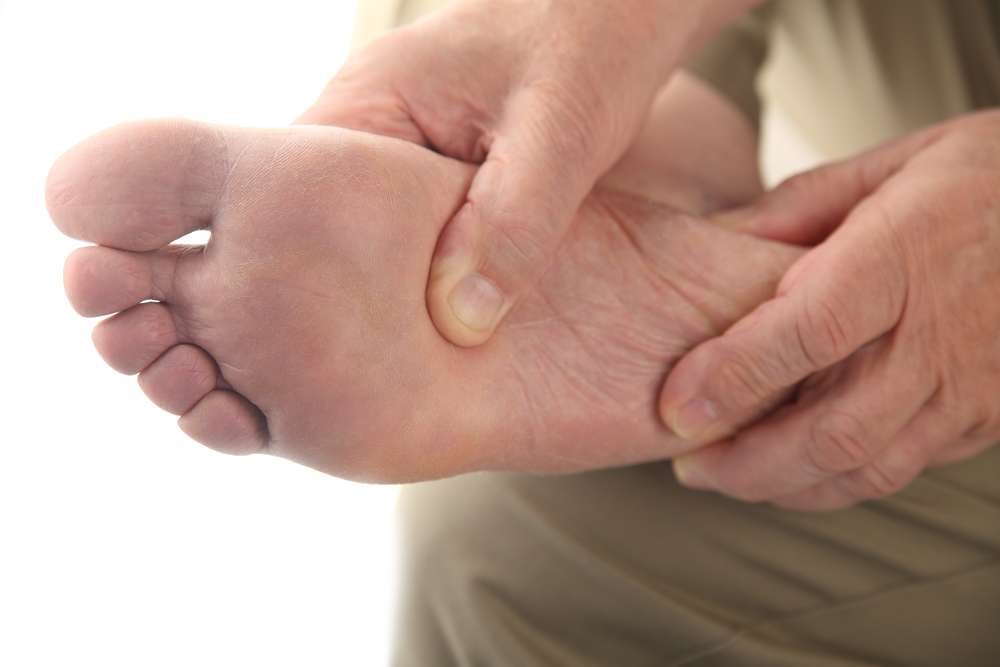6650 Frankford Ave
Philadelphia, PA 19135
 Neuropathy occurs when nerves that are in the feet or hands become damaged. Common symptoms of neuropathy include a sense of numbness or tingling, burning or stabbing pain, a loss of balance, and muscle weakness in the feet. Those who are older, have a family history of neuropathy, are malnourished, or have preexisting conditions like diabetes or cancer, are at a higher risk for developing neuropathy. Treatment options for this condition may include a nutritional plan, pain medications, or physical therapy. If you believe that you are afflicted with neuropathy it is important to consult with a podiatrist for proper treatment.
Neuropathy occurs when nerves that are in the feet or hands become damaged. Common symptoms of neuropathy include a sense of numbness or tingling, burning or stabbing pain, a loss of balance, and muscle weakness in the feet. Those who are older, have a family history of neuropathy, are malnourished, or have preexisting conditions like diabetes or cancer, are at a higher risk for developing neuropathy. Treatment options for this condition may include a nutritional plan, pain medications, or physical therapy. If you believe that you are afflicted with neuropathy it is important to consult with a podiatrist for proper treatment.
Neuropathy
Neuropathy can be a potentially serious condition, especially if it is left undiagnosed. If you have any concerns that you may be experiencing nerve loss in your feet, consult with John M. Fanelly, DPM from Northeast Philadelphia. Our doctor will assess your condition and provide you with quality foot and ankle treatment for neuropathy.
What Is Neuropathy?
Neuropathy is a condition that leads to damage to the nerves in the body. Peripheral neuropathy, or neuropathy that affects your peripheral nervous system, usually occurs in the feet. Neuropathy can be triggered by a number of different causes. Such causes include diabetes, infections, cancers, disorders, and toxic substances.
Symptoms of Neuropathy Include:
Those with diabetes are at serious risk due to being unable to feel an ulcer on their feet. Diabetics usually also suffer from poor blood circulation. This can lead to the wound not healing, infections occurring, and the limb may have to be amputated.
Treatment
To treat neuropathy in the foot, podiatrists will first diagnose the cause of the neuropathy. Figuring out the underlying cause of the neuropathy will allow the podiatrist to prescribe the best treatment, whether it be caused by diabetes, toxic substance exposure, infection, etc. If the nerve has not died, then it’s possible that sensation may be able to return to the foot.
Pain medication may be issued for pain. Electrical nerve stimulation can be used to stimulate nerves. If the neuropathy is caused from pressure on the nerves, then surgery may be necessary.
If you have any questions, please feel free to contact our office located in Philadelphia, PA . We offer the newest diagnostic and treatment technologies for all your foot care needs.
 Diabetes can leave the feet extra vulnerable to injury and infection. Because of this, it is important to take daily steps to keep your feet healthy. Check your feet every day for cuts, blisters, red spots, and swelling. Left untreated, damage to the skin of the feet can lead to the formation of diabetic foot ulcers, slow-healing wounds that can lead to complications like infection. Keep your feet clean and well-moisturized by washing them in room temperature water, drying them thoroughly, and then applying a cream or lotion. Trim your toenails straight across regularly to avoid ingrown toenails. For more information about caring for diabetic feet, please consult with a podiatrist.
Diabetes can leave the feet extra vulnerable to injury and infection. Because of this, it is important to take daily steps to keep your feet healthy. Check your feet every day for cuts, blisters, red spots, and swelling. Left untreated, damage to the skin of the feet can lead to the formation of diabetic foot ulcers, slow-healing wounds that can lead to complications like infection. Keep your feet clean and well-moisturized by washing them in room temperature water, drying them thoroughly, and then applying a cream or lotion. Trim your toenails straight across regularly to avoid ingrown toenails. For more information about caring for diabetic feet, please consult with a podiatrist.
Diabetic foot care is important in preventing foot ailments such as ulcers. If you are suffering from diabetes or have any other concerns about your feet, contact John M. Fanelly, DPM from Northeast Philadelphia. Our doctor can provide the care you need to keep you pain-free and on your feet.
Diabetic Foot Care
Diabetes affects millions of people every year. The condition can damage blood vessels in many parts of the body, especially the feet. Because of this, taking care of your feet is essential if you have diabetes, and having a podiatrist help monitor your foot health is highly recommended.
The Importance of Caring for Your Feet
Patients with diabetes should have their doctor monitor their blood levels, as blood sugar levels play such a huge role in diabetic care. Monitoring these levels on a regular basis is highly advised.
It is always best to inform your healthcare professional of any concerns you may have regarding your feet, especially for diabetic patients. Early treatment and routine foot examinations are keys to maintaining proper health, especially because severe complications can arise if proper treatment is not applied.
If you have any questions please feel free to contact our office located in Philadelphia, PA . We offer the newest diagnostic and treatment technologies for all your foot and ankle needs.
 The foot condition that is known as hammertoe is often noticeable, and easily diagnosed. It typically affects the middle joints of the second or third toe, causing the joint to bend upward and the toes to bend downward. This condition often develops gradually due to genetic factors and from wearing shoes that do not have adequate room for the toes to move freely in. It is helpful to wear a larger size shoe that can accommodate the hammertoe, and mild relief may be found when a protective pad is worn over the affected joint. Corns may form on the top of the joint from friction that can come from the shoes that are worn. If you have hammertoe, it is strongly suggested that you are under the care of a podiatrist who can properly diagnose and treat this condition.
The foot condition that is known as hammertoe is often noticeable, and easily diagnosed. It typically affects the middle joints of the second or third toe, causing the joint to bend upward and the toes to bend downward. This condition often develops gradually due to genetic factors and from wearing shoes that do not have adequate room for the toes to move freely in. It is helpful to wear a larger size shoe that can accommodate the hammertoe, and mild relief may be found when a protective pad is worn over the affected joint. Corns may form on the top of the joint from friction that can come from the shoes that are worn. If you have hammertoe, it is strongly suggested that you are under the care of a podiatrist who can properly diagnose and treat this condition.
Hammertoes can be a painful condition to live with. For more information, contact John M. Fanelly, DPM of Northeast Philadelphia. Our doctor will answer any of your foot- and ankle-related questions.
Hammertoe
Hammertoe is a foot deformity that occurs due to an imbalance in the muscles, tendons, or ligaments that normally hold the toe straight. It can be caused by the type of shoes you wear, your foot structure, trauma, and certain disease processes.
Symptoms
Risk Factors
Treatment
If you have hammertoe, you should change into a more comfortable shoe that provides enough room for your toes. Exercises such as picking up marbles may strengthen and stretch your toe muscles. Nevertheless, it is important to seek assistance from a podiatrist in order to determine the severity of your hammertoe and see which treatment option will work best for you.
If you have any questions, please feel free to contact our office located in Philadelphia, PA . We offer the newest diagnostic and treatment technologies for all your foot care needs.
The feet are the foundation of the body, and pregnancy can cause specific foot conditions to occur. This may be a result of additional weight gain and possible changes in the shape of the feet. Fluid build-up, which is referred to as edema, can be caused by hormonal changes, and may be reduced by carefully monitoring your sodium intake. The feet may change size, and it is beneficial to regularly have your feet measured. When purchasing shoes, it is helpful to buy a pair that have adequate cushioning. It is also suggested that you avoid wearing high heels. When specific foot stretches are routinely performed, existing pain may be reduced. If you are pregnant and would like additional information about proper foot care during pregnancy, it is recommended that you consult with a podiatrist.
Pregnant women with swollen feet can be treated with a variety of different methods that are readily available. For more information about other cures for swollen feet during pregnancy, consult with John M. Fanelly, DPM from Northeast Philadelphia. Our doctor will attend to all of your foot and ankle needs.
What Foot Problems Can Arise During Pregnancy?
One problem that can occur is overpronation, which occurs when the arch of the foot flattens and tends to roll inward. This can cause pain and discomfort in your heels while you’re walking or even just standing up, trying to support your baby.
Another problem is edema, or swelling in the extremities. This often affects the feet during pregnancy but tends to occur in the later stages.
How Can I Keep My Feet Healthy During Pregnancy?
If you have any questions please feel free to contact our office located in Philadelphia, PA . We offer the newest diagnostic and treatment technologies for all your foot and ankle needs.